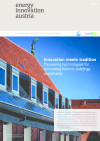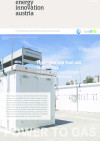Suchergebnisse für "Factsheet: Energietechnologien gestalten, die für alle sinnvoll und nutzbar sind"
Measures for Minimisation of Rebound-Effects Concerning Residential Building Renovation (MARESI)

Development of a pragmatic assessment scheme applicable to building practice for the impact of building products on human health
Systemic renovation in the social housingsector

This project treats a global renovation of a residential estate built in the 1960s in the context of council housing in a laggard region. The point is to optimise with a systemic approach in a interdisciplinary team all partitions which include habitation.
Information-point for renewable and environmental/ecological materials

An internet platform with full information and detailed data about building materials made of renewable resources, which serves as the central information-point for different stake holders - from private house builders over architects and master-builders to experts in the field of building laws and regulations.
IEA AFC Annex 35: Fuel cells for portable applications (Working period 2017 - 2019)
The aim of Annex 35 is the information exchange on the status and new developments of portable fuel cell systems and comprises the development and manufacture of membrane electrode assemblies (MEAs) all the way through to system components such as electronic converters or gas supply units. In addition the setup and configuration of hybridized systems and the key topics of secure operation, codes and standards are of interest.
IEA PVPS Task 13: Reliability and Performance of Photovoltaic Systems (Work Plan 2024 - 2025)
IEA PVPS Task 13 engages in focusing the international collaboration in improving the reliability of photovoltaic systems and subsystems by collecting, analyzing and disseminating information on their technical performance and durability, providing a basis for their technical assessment, and developing practical recommendations for improving their electrical and economic output in different climatic regions.
Evaluation of visionary architectural concepts
The aim of this project is to show that even at first glance unrealistic and seemingly unworkable solutions can contribute to overcome or mitigate increasingly global problems. The keywords "smart city", "smart home" (and similar ones) require solutions that are envisioned on free roads, as off-the-shelf solution often do not deliver the required output.
IEA ES Task 43: Storage for renewables and flexibility through standardized use of building mass
Thermal building mass activation uses building masses to condition interior spaces, but can also function as energy storage through targeted overheating/undercooling. This storage potential can be used for local and grid-connected renewable thermal and electrical energy (Power2Heat). The project develops new content on the construction, control and business models of such storages and disseminates it as guidelines, data and on the basis of best-practice objects that have been implemented.
Secondary Phosphorus as Raw Material for the Chemical Industry
Recycling of Phosphorus as Contribution to the Security of Supply of Bioeconomy
Erfolgsstory Passivhaus - Let's go passive!
6. Mar 2003
Welser Energiesparmesse, Boschhalle (Eingang Nord), Radio Oberösterreich-Bühne und Areal "Sonderschau Passivhaus" der IG PassivhausWels, AT
Großes Passivhaus Event im Rahmen der Welser Energiesparmesse
SPIDER - Subtraction as a measure to Preserve and Insulate historic Developments by Electric Robots
The purpose of this exploration is to unlock the potential of autonomous, data-driven robots that achieve improvements of the thermal building performance through air entrapments in a continuous process.
Workshop: Althaussanierung mit Passivhauspraxis
3. Nov 2003
Landhaus, OstarrichisaalSt. Pölten, AT
Veranstaltung zum Projektabschluss des Haus der Zukunft-Projekts
Smart ABC Smart Energy Efficient Active Buildings and Building Clusters
The EPBD recast 2010 targeted "nearly zero energy buildings". This low amount of energy is to be covered by energy from renewable energy sources. The project "Smart ABC" analysed a variety of relevant solution sets regarding the building performance and the renewable based energy supply options. Energetic and ecological impacts were analyzed in order to optimize the integration of renewable energy technologies in building standards and to find answers how to depict a building cluster regarding standards and tools.
IEA SHC PVT Task 60: Applications of Photovoltaic/thermal (PVT) Systems and New Fields of Application and Examples of PVT
The international research collaboration IEA SHC Task 60 (Application of PVT Collectors) identified existing applications for PVT technologies and evaluated and highlighted potential system solutions where PVT technology has clear advantages over separate installation of PV modules and solar thermal collectors. In analogy, their advantages and current barriers for a broad market acceptance were highlighted.
Energy efficient, resource conserving and differentiated renovation of historic European building stocks (ReCoRe)
The project goal was the development of an integrated, long term and life cycle oriented approach to sustainable modernisation of historical building stocks. Within this project the partners used common objectives and planning tools and followed a common procedure in order to develop a specific national application which results from a historical, technical, social and cultural understanding of the specific national stock fragments.
Joined Workshop - Clean & Efficient Combustion with Advanced Motor Fuels (AMF)
6. November 2019
Montreux, CH
In the course of the AMF ExCo Meeting and the Combustion TCP Task Leaders Meeting, both taking place in Montreux, Switzerland early November 2019, both TCPs will jointly host a workshop. It will focus around low emission propulsion systems, novel fuels for advanced engine concepts, and new developments and trends.
openBAM - Open Building Automation Modelling - Open modeling of building automation over the entire building life cycle
Platform-independent modeling of control and regulation logic for detailed study of building automation systems involving construction and building technology. The result enables the analysis of energy saving potentials through building automation before construction.
Tagung: 5. Nationale Photovoltaik-Tagung
25. Mar 2004 -
26. Mar 2004
ETH ZürichZürich, CH
Integration Solarstrom - Architektur
Innovation meets tradition

Pioneering technologies for renovating historic buildings sustainably
energy innovation austria
1/2014
Herausgeber: BMVIT und Klima- und Energiefonds
Englisch, 8 Seiten
Downloads zur Publikation
Hydrogen and fuel cell technology

in the energy and transport systems of the future
energy innovation austria
2/2015
Herausgeber: BMVIT und Klima- und Energiefonds
Englisch, 8 Seiten
Downloads zur Publikation
IEA Bioenergy Task 40 Newsletter: Halbjahresbericht Juni 2020 - Jänner 2021 (2/2021)

Halbjährlicher Newsletter des IEA Bioenergy Task 40: Bereitstellung biobasierter Wertschöpfungsketten
Herausgeber: IEA Bioenergy Task 40
Englisch, 4 Seiten
